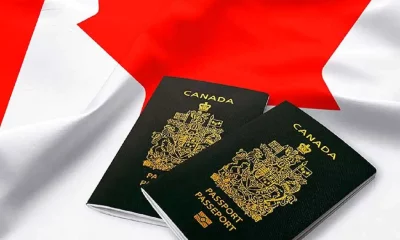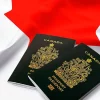Career
How to Marry A Canadian and Begin New Life in Canada
Moving to Canada by marrying a Canadian citizen is a life-changing decision that involves not just the excitement of a new life together but also navigating a complex legal process. Canada is known for its diverse culture, stunning natural beauty, and high quality of life, making it a desirable destination for many. However, the process of moving to Canada through marriage involves navigating complex legal frameworks, immigration policies, and bureaucratic procedures.
This guide aims to provide a detailed roadmap for those considering this path, covering everything from understanding the legalities of marriage in Canada, to navigating the immigration process, and ultimately settling into life in a new country. Whether you’re in the early stages of planning your wedding or already married and preparing to move, this guide will help you understand each step involved, ensuring that your transition to Canadian life is as smooth and stress-free as possible.
Marrying a Canadian can open the door to a new life filled with opportunities, but it also requires careful planning and a thorough understanding of the steps you need to take. From obtaining the necessary marriage licenses and proving the authenticity of your relationship, to applying for permanent residency and eventually settling into Canadian society, every detail matters. By following this guide, you’ll be well-prepared to embark on this exciting journey, confident in your ability to successfully navigate the challenges and embrace the opportunities that come with marrying a Canadian and moving to Canada.
Moving to Canada to Get Married: What the Non-Canadian Partner Needs to Know
If you’re living outside of Canada and your partner is in Canada, you may decide to travel to Canada to have your wedding. Here’s how the process works:
1. Secure the Appropriate Visa or Entry Authorization
Before you can travel to Canada to get married, you must ensure that you have the legal right to enter the country.
Visitor Visa or eTA: Depending on your nationality, you may need a visitor visa or an Electronic Travel Authorization (eTA) to enter Canada. A visitor visa allows you to stay in Canada temporarily, typically for up to six months, which gives you enough time to get married and complete the necessary formalities.
2. Entering Canada
When you arrive at a Canadian port of entry, you must be prepared to explain the purpose of your visit. Be honest about your intention to marry and provide any necessary documentation, such as:
– Proof of Relationship: Documents like photos, communication records, or an invitation from your partner can help demonstrate your genuine relationship.
– Wedding Plans: Evidence like a booking confirmation from the wedding venue or an appointment for a marriage license.
3. Obtain a Marriage License
Once in Canada, you and your partner must apply for a marriage license in the province where the wedding will take place. This step involves:
- In-Person Application: Both partners must appear together to apply for the marriage license.
- Documentation: Valid identification and proof of marital status (if applicable) must be provided.
- Witnesses: You’ll need two adult witnesses for the ceremony. These can be friends, family members, or even people arranged by the officiant or venue.
4. Getting Married in Canada
With the marriage license in hand, you can proceed with the wedding. After the ceremony, the officiant will register the marriage, and you can apply for a marriage certificate.
5. Post-Wedding Considerations
If you plan to stay in Canada after the wedding, you’ll need to apply for permanent residency through the Spousal Sponsorship Program. This process requires additional documentation and approvals.
Getting Married Outside of Canada to Immigrate: Steps to Follow
In this scenario, the Canadian partner will have to travel to the non-Canadian partner’s country to get married. Here’s what both partners need to know:
1. Understand the Legal Requirements in the Non-Canadian Partner’s Country
Every country has its own legal requirements for marriage, and it’s important to be familiar with them. This might include:
– Marriage License: Determine where and how to obtain a marriage license in the non-Canadian partner’s country. Requirements may include providing identification, proof of marital status, and possibly other documents like birth certificates or parental consent if under a certain age.
– Witnesses: Similar to Canada, most countries require witnesses to sign the marriage documents. These can be family, friends, or people provided by the officiant or venue.
– Residence Requirements: Some countries may have a residency requirement, meaning one or both partners must live in the country for a certain period before getting married.
2. Obtain the Necessary Documents
Ensure both partners have all required documentation, which may include:
– Valid Passports: Both partners will need to show valid passports.
– Canadian Documents: The Canadian partner might need to provide a Certificate of No Impediment to Marriage or a similar document, proving they are legally free to marry. This can often be obtained from a Canadian embassy or consulate.
3. Getting Married in the Non-Canadian Partner’s Country
Once all legal requirements are met, you can proceed with the marriage ceremony. After the wedding, ensure that the marriage is properly registered according to local laws.
4. Recognizing the Marriage in Canada
After getting married outside of Canada, it’s important to ensure the marriage is recognized in Canada. Usually, a marriage legally performed in another country is recognized in Canada, but you might need to provide the following:
– Marriage Certificate: Obtain an official marriage certificate from the country where the marriage took place.
– Translation: If the marriage certificate is not in English or French, you may need to have it translated by a certified translator.
Plan for Your Immigration to Canada
Once you’re married, you’ll need to apply for immigration to Canada. Canada offers several pathways for spouses to obtain permanent residency, the most common being the Spousal Sponsorship Program.
Spousal Sponsorship Program: The Canadian citizen or permanent resident (your spouse) can sponsor you for permanent residency. To be eligible, you must:
– Be legally married to a Canadian citizen or permanent resident.
– Be at least 18 years old.
– Prove that your marriage is genuine and not solely for immigration purposes.
Canada Spousal Sponsorship Application Procedures
The application process involves several steps:
1. Complete the Sponsorship Application: Your spouse must submit an application to sponsor you.
2. Submit Your Permanent Residency Application: You will need to complete a permanent residency application that includes your personal information, proof of your relationship, medical examinations, and police certificates.
3. Provide Supporting Documents: These may include marriage certificates, photographs, communication records, and evidence of shared financial responsibilities to prove the authenticity of your relationship.
4. Pay the Application Fees: There are fees associated with both the sponsorship application and the permanent residency application.
5. Wait for Processing: The processing time can vary depending on your country of origin and other factors. It typically takes about 6 months, but it can be longer in some cases.
Moving to Canada to Join Your Partner
Once your permanent residency is approved, you can move to Canada and start your new life.
1. Plan Your Move: Moving to a new country involves more than just packing your bags. You’ll need to consider housing, employment, healthcare, and adapting to a new culture.
2. Health Insurance: Canada has a public healthcare system, but there may be a waiting period before you become eligible. It’s advisable to get private health insurance in the meantime.
3. Employment: As a permanent resident, you will have the right to work in Canada. However, it’s a good idea to start job hunting before you arrive. Research the job market in your field and consider getting your qualifications recognized in Canada if necessary.
4. Settle in Canada: Once you arrive, you’ll need to get a Social Insurance Number (SIN), set up a bank account, and start integrating into Canadian society. Many newcomers find it helpful to connect with community organizations that provide settlement services.
Maintaining Your Permanent Residency and Citizenship
After moving to Canada, maintaining your permanent residency status is essential. You must live in Canada for at least two out of every five years to retain your status. After living in Canada for three out of five years as a permanent resident, you may be eligible to apply for Canadian citizenship.
Building A Life in Canada
Canada is known for its high quality of life, multicultural communities, and beautiful landscapes. As you settle in, take the time to explore your new surroundings, engage with the community, and build a life together with your spouse.
– Learn About Canadian Culture: Understanding Canadian customs, holidays, and social norms will help you integrate more smoothly.
– Make Connections: Building a social network can ease the transition and help you feel more at home.
– Explore the Country: Canada is vast, with a wide variety of natural landscapes, from mountains to lakes to forests. Traveling and exploring your new country can be a wonderful experience.
Conclusion
Marrying a Canadian and moving to Canada is a significant and rewarding step. While the process involves navigating legal requirements, immigration procedures, and settling in a new country, the outcome is a new chapter in your life together. With careful planning, patience, and determination, you can successfully transition to your new life in Canada.















